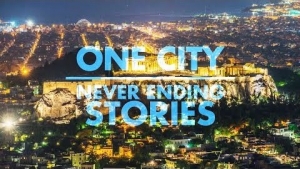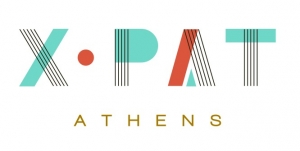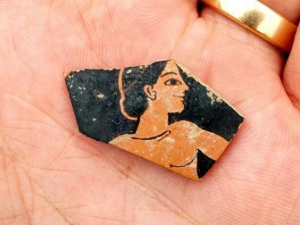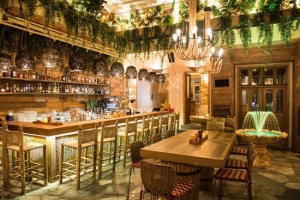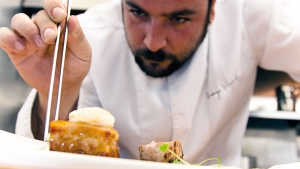LIFE & CULTURE
XpatAthens
Monday, 29 April 2019 07:00
Berlin - The City With Unexpected Greek Flair
There are many interesting things to do in Berlin, Germany, and it might surprise you that many of the city's sights are influenced by Greek art and culture. Here are few things not to miss while in Berlin.
Pergamon Museum
Here you will find Greek artifacts including the reconstruction of Greek buildings from the ancient city of Miletus in Ionia, such as Pergamon Altar and the market gate of Miletus, whose parts were transported from the ancient city itself. You will also discover a piece of Greek history as the brilliant collection of antiquities that includes the altar of Pergamon, which dates back to the 2nd century BC.
The Brandenburger Gate
Built between 1788-1791 and located in the center of the city, the Brandenburger Gate was designed by Karl Gkotcharnt Langkchans and is based on the Propylaea of the Acropolis in Athens. If you look closer, you will find that on both sides of the monument there are scenes from Greek mythology!
Topography of Terror
At the outdoor/indoor history museum in Berlin called the Topography of Terror museum, you will see compelling exhibits documenting the terror of the Nazi regime. The museum is built on the site where buildings were used by the Nazi regime from 1933 to 1945 as the headquarters of the Gestapo and the SS.
The Nazi regime destroyed much of Greece and completely demolished many Greek villages. It is a dark time in the history of Europe, and you can learn more about it at the museum through photographic and audiovisual material which has a special section dedicated to Nazi occupation in Greece.
To read this article in full, please visit: Greek Reporter
Published in
International Travel
Tagged under
Monday, 19 December 2016 07:00
Athens In 60 Seconds - One City, Never Ending Stories
‘Athens is one of the world’s oldest cities; with so many places to visit, things to experience, stories to be told. And if you had only 60 secs to describe it, this is how Athens would look and sound.’
Athens Mayor Yiorgos Kaminis announced the 'Athens Tourism Partnership,' an initiative for tourism promotion in Athens. The City of Athens, Aegean Airlines, and the Athens International Airport unite for the first time having a common objective - promoting Athens as a modern cultural centre and attractive tourist destination throughout the year.
The first result of this collaboration is a new, vibrant and dynamic campaign entitled 'One City. Never Ending Stories' aimed at showcasing the Athenian experience.
Athens Mayor Yiorgos Kaminis announced the 'Athens Tourism Partnership,' an initiative for tourism promotion in Athens. The City of Athens, Aegean Airlines, and the Athens International Airport unite for the first time having a common objective - promoting Athens as a modern cultural centre and attractive tourist destination throughout the year.
The first result of this collaboration is a new, vibrant and dynamic campaign entitled 'One City. Never Ending Stories' aimed at showcasing the Athenian experience.
To read this article in full, please visit: Greek News Agenda
Published in
Videos
Tagged under
Monday, 27 November 2017 07:00
12 Things To Do In Athens Over Christmas
Writer and blogger Marissa Tejada from Travel Greece Travel Europe discusses the perks of being in Athens for Christmas! In recent years, Athens has been coined as an emerging European city break destination. That holds true for the curious Christmas traveler. Traveling during the winter season here is great. Why? Less crowds, for one. You’ll experience Greece outside of its summer skin and see the way Greeks celebrate one of their favorite holidays.
Feel the Holiday Vibe in Syntagma Square
The heart of the city is Syntagma Square and it’s where the city’s Christmas tree is lit. The square’s trees are strung with blue and white lights (the holiday colors of Greece) or with decorations such as karavakia (small Christmas ships). The municipality also schedules a series of free concerts during the month of December.
Walk to the Scenic Spots of Athens
With a mild Mediterranean winter you can enjoy a scenic and sunny walk to some of the best panoramic spots of the city. Here are some photos from last winter when I took a Christmas day walk around Lycabettus Hill in Kolonaki.
While not as fancy or glamorous as other European Christmas markets, Athens has a few markets known as bazaars. Local artisans sell everything from handmade soaps, traditional Greek products to jewelry. Some bazaars are located in the metro stations (including Syntagma).
Explore Ancient Greece
Without any crowds to push through or lines to wait on, Christmas holidays in Athens are a great time to explore. Visit the best museums in Greece including the National Archaeological Museum of Athens or the Acropolis Museum.
Indulge in Greek Holiday Desserts
During Christmas holidays in Athens, head into any bakery and be tempted by traditional treats like kourabiedes (sugar cookies) and melomakarona (honey cookies). You’ll find both types of cookies displayed side by side.
Published in
City Discovery
Tagged under
Thursday, 19 January 2017 07:00
XpatAthens Is For Sale
Are you looking for something new, exciting and challenging? There is no better time than the present - XpatAthens is for sale!!
XpatAthens has been connecting the English speaking community of Athens since 2007, and with under 2 years since its re-branding, it is more ready than ever to continue growing! If you are full of energy, bursting with ideas, and absolutely love Athens and its expat community then maybe you are the right fit to be the next leader of this exceptional information gateway.
Serious enquiries for purchase can be emailed to future@xpatathens.com.
Published in
Local News
Tagged under
Thursday, 15 December 2016 07:00
Archaeologists Discover Lost City Dating Back 2,500 Years
Archaeologists have discovered an old lost city in Greece dating back 2,500 years!
Researchers from the University of Gothenburg and the University of Bournemouth have begun exploring the ruins at a village called Vlochos, around 300km (190 miles) north of Athens.
The team, which also includes researchers from the Ephorate of Antiquities of Karditsa, found the remains of towers, walls and city gates on the summit and slopes of the hill.
The leader of the team, Robin Ronnlund, said the city appears to have flourished from the fourth to the third century BC before it was abandoned — possibly because of the Roman conquest of the area.
To read this article in full, please visit: Independent
Published in
Greece In The News
Tagged under
Tuesday, 13 December 2016 19:36
The Athenian - Authentic Greek Souvlaki In London
We are Efthymios and Neofytos, two Londoners born and raised in Athens and Cyprus. We have recently launched The Athenian, a small street food venture in London, offering freshly-made souvlaki prepared in the healthiest, most authentic way possible.
We are sure you know that our home country has been through some troubling times recently. By creating our own little business here in London, we help support people back home by sourcing our products from small, independent producers and farmers as well as local businesses here in the UK. We aim to keep our carbon footprint low where we can, without ever compromising on the authentic Mediterranean experience we want to bring to our customers.
We are proud to say we can trace back all of the carefully-selected ingredients used in our souvlaki. Our pita is hand-made in Athens, our olive oil is from the small town of Sitia in Crete, our herbs are from the mountainous town of Karpenisi and our dairy products come from the beautiful region of Messinia in the Peloponnese.
On moving to the UK, we realised that Greek cuisine was being somewhat misrepresented here. We were often disappointed by out-dated, unappetizing dishes and our search for lovingly-made, mouth-watering souvlaki was nearly impossible.
That’s how The Athenian came about: we wanted to bring something new to the people of London, with an updated image of Greek cuisine, to the city’s thriving food markets. By paying us a visit you will find souvlaki the way it is meant to be made: simple, fresh and authentically Greek.
To read this article in full, please visit: The Athenian
Published in
People
Tagged under
Tuesday, 13 December 2016 07:00
Greek Sushi Chef Among World's 100 Best Chefs
Greek sushi master Antonis Drakoularakos, owner of Athens restaurant Sushimou, was named among the world’s 100 top chefs at the award ceremony of the first Chefs World Summit this year!
The 37-year-old physicist-turned-chef came in last on the list that places him among the ranks of the legendary Alain Passard (first place) of L’Arpege in Paris and Martin Berasategui (second place) of the eponymous eatery in Lasarte Oria, Spain.
To read this article in full, please visit: Ekathimerini
Published in
Local News
Tagged under
Monday, 12 December 2016 07:00
Cozy Night Out In Athens
Oh the weather outside is frightful… So the song goes, and so the season brings! Winter doesn’t seem to scare off most Athenians from their nighttime fun. Let’s face it, even the coldest day in Athens is like a warm spring breeze in more northerly climates. But with decidedly chilly winter temperatures outside and Christmas around the corner, the best weekend plan is to phone a friend and plan a night out in a warm and cozy place…
We started our evening at Sowl in Thiseio. I’ve been here a few times, and even written about it in this space. Sowl is a restaurant-bar-art space in the old Stavlos space that used to house the stables of King Otto in the 19th century. It’s a cool, interesting space, with a newly refined menu that focuses on great Latin American-style food, everything from gourmet tacos to ceviche – with lots in between. A great Greek and international wine list, friendly service, DJ-led creative music soundtrack - definitely a cut above. The place on Saturday was almost fully reserved, but we managed to slip into a couple spots at the bar. When you’ve had your fill of tavernas, and have a couple extra euros to spend on something ‘different’, Sowl is worth a visit. Check out their site and Facebook page for events and gallery exhibits!
By the time our wine glasses had run dry, we had received an invite to meet another group of friends at Riza Riza in Koukaki. It was a last-minute birthday get together, and this is a newish place in the area. Now, let’s be clear: to walk from Thiseio to Koukaki should take between 10 and 15 minutes. On this particular Saturday night, we decided to drive over in my friend’s car. The drive over took about 5 minutes. The hunt for parking in Koukaki’s winding streets took – no exaggeration – 35 minutes! What started as an attempt to save some time ended up as an exercise in patience. I know I know – how long have I lived here?? But seriously, I think I had forgotten…
Frustrated and fully convinced of my decision to not own a car in Athens, we finally arrived at Riza Riza and joined our friends. Riza Riza is a casual, happening bar, with indoor/outdoor seating, extended seating in the back, a modern Greek styling and a hip attitude. It was really buzzing that night, and felt like a warm neighbourhood ‘local’. This is an all-day bar/café, with a small food menu, a great Greek-inspired cocktail list. Best feature for a cold winter’s night: hot winter cocktails like rakomelo and oinomelo. Exactly what the doctor ordered.
Lesson #1: Don’t let the cold stop you from enjoying a night out!
Lesson #2: Leave the car at home.
Until next week,
Jack
p.s. for those of you yet to explore the Koukaki district – here’s a great place to start: http://koukaki.gr/
Sowl
Iraklidon 10, Thiseio
Website
Facebook
Riza Riza
Drakou 19, Koukaki
Facebook
p.s. for those of you yet to explore the Koukaki district – here’s a great place to start: http://koukaki.gr/
Sowl
Iraklidon 10, Thiseio
Website
Riza Riza
Drakou 19, Koukaki
Published in
My Week In Athens
Tagged under
Monday, 12 December 2016 07:00
Athens Observatory Continues Mars Observation With National Geographic
The National Observatory of Athens on Wednesday announced the continuation of its collaboration with the “National Geographic” for the observation of Mars through telescopes, which will be used in the “Mars” documentary series.
At the Athens Observatory Visitor’s center, guests can observe the sky using the historic Doridis telescope on the Pnyx Hill, as well as through two portable telescopes that are available for the public, provided weather conditions allow.
To read this article in full, please visit: Greek Reporter
Published in
Local News
Tagged under
Monday, 12 December 2016 07:00
7 New Restaurants Opening In Athens
The holidays are an exciting time to try new restaurants and explore more of Athens! Here is a list of 7 new restaurants that have opened (or will open very soon!) in Athens.
Vasilainas
Address: 13 Vrasida, Piraeus
Telephone: 693 720 0217
Website
The historical restaurant of Piraeus is now opening its doors in Athens on Vrasidas Street just behind the Hilton Hotel. The place will soon be ready and we will see the impressive roof (a grid of wine bottles with optical fibers), the results of the partnership of three talented young chefs, Manos Garnelis, Dimos Balopoulos and Nikos Vlachakis. Fish and meat will coexist on the new menu, with emphasis given to the fish menu. To get an idea, the menu will include scabecheoctopus, a grilled with mashed chickpea soup, spicy tomato salad, pasta with shrimp, smoked tomato and basil, and grilled grouper with mashed beetroot.
Ommu
Vasilainas
Address: 13 Vrasida, Piraeus
Telephone: 693 720 0217
Website
The historical restaurant of Piraeus is now opening its doors in Athens on Vrasidas Street just behind the Hilton Hotel. The place will soon be ready and we will see the impressive roof (a grid of wine bottles with optical fibers), the results of the partnership of three talented young chefs, Manos Garnelis, Dimos Balopoulos and Nikos Vlachakis. Fish and meat will coexist on the new menu, with emphasis given to the fish menu. To get an idea, the menu will include scabecheoctopus, a grilled with mashed chickpea soup, spicy tomato salad, pasta with shrimp, smoked tomato and basil, and grilled grouper with mashed beetroot.
Ommu
Omu, which means parrot in Japanese, is the old 'Oozora' in Kifissia. The upper bar will gain a new style making an autonomous Bar-Restaurant. Gourmet streetfood by George Venieris, cocktails and "lives" that are not very common in Kifissia, give a different tone to this new concept. The taste proposals will include a not so clean cut ceviche and sashimi, hot dogs, burgers with caramelized buns, and funky pizzas including duckgonzola with duck and gorgonzola.
Food Mafia Sin City
Food Mafia Sin City
Adress: Βουκουρεστίου 4
Telephone: 210 324 8062
Website
Food Mafia, which used to be in Glyfada, is now opening during the first week of December at Voukourestiou 4 in Athens. In cooperation with the pre-existing ground floor of the interwar building V4, Food Mafia Sin City invites people to taste Elias Skoulas style. At noon during the lunch menu, there will be a snack attack menu, inspired by his favorite American chef canteens. Customers must try Papusas, corn pies of El Salvador and toast with foie gras and grilled peaches! The menu has the aesthetic of a cult 70's American magazine.
Big Kahuna
Telephone: 210 324 8062
Website
Food Mafia, which used to be in Glyfada, is now opening during the first week of December at Voukourestiou 4 in Athens. In cooperation with the pre-existing ground floor of the interwar building V4, Food Mafia Sin City invites people to taste Elias Skoulas style. At noon during the lunch menu, there will be a snack attack menu, inspired by his favorite American chef canteens. Customers must try Papusas, corn pies of El Salvador and toast with foie gras and grilled peaches! The menu has the aesthetic of a cult 70's American magazine.
Big Kahuna
Address: 43 Salaminos St., Kerameikos
Telephone: 693 699 8428
Website
While Big Kahuna by Stefanos Stefanidis and Dimitris Balian is being prepared to open its doors, imagine a warehouse-workshop with a huge garage door, which will open and put you in a beach bar interior: floor like sand, tables in Caribbean style and exotic plants. At Big Kahuna, the food is exotic with streetfood Hai materials. You may find ramen and fried rice in banana to Wagyu shark!
Ble Alepou Papantonis
Website
While Big Kahuna by Stefanos Stefanidis and Dimitris Balian is being prepared to open its doors, imagine a warehouse-workshop with a huge garage door, which will open and put you in a beach bar interior: floor like sand, tables in Caribbean style and exotic plants. At Big Kahuna, the food is exotic with streetfood Hai materials. You may find ramen and fried rice in banana to Wagyu shark!
Ble Alepou Papantonis
Address: Kifissias Av. 158 & Thomas Economou 2, New Psychiko
Bright & simple is how the next business step by Kostas Papantonis is going to be called after Prime Grill, which closes its doors this year after several years of operation. The new project will open this December and will a have bar-restaurant character, placing emphasis on wine with several Greek and foreign labels.
Ventiri
The new grill that is currently being prepared by the team of Agora Select, is likely to open its doors over the holidays. In its culinary choices, you will may find pies in foil like the Moscow chicken pie with smoked cheese and colorful peppers, meat pie with ground beef, vegetables and mint, all of which are baked in the oven. You can find a wide variety of dishes from bisteka Fiorentina to black pig hot dogs with caramelized onions and Black Angus skirt.
Steak Frites
Bright & simple is how the next business step by Kostas Papantonis is going to be called after Prime Grill, which closes its doors this year after several years of operation. The new project will open this December and will a have bar-restaurant character, placing emphasis on wine with several Greek and foreign labels.
Ventiri
The new grill that is currently being prepared by the team of Agora Select, is likely to open its doors over the holidays. In its culinary choices, you will may find pies in foil like the Moscow chicken pie with smoked cheese and colorful peppers, meat pie with ground beef, vegetables and mint, all of which are baked in the oven. You can find a wide variety of dishes from bisteka Fiorentina to black pig hot dogs with caramelized onions and Black Angus skirt.
Steak Frites
Address: Φιλελλήνων 18
Telephone: 215 500 3007
Website
At Steak Frites by ToyBox Legends, which will open in a neoclassical building on Filellinon street, the kitchen run by Kostas Tsigka suggests culinary proposals that complement pasta, risotto and lunchtime steak sandwiches.
Originally posted on athinorma.gr
Translated by XpatAthens
Telephone: 215 500 3007
Website
At Steak Frites by ToyBox Legends, which will open in a neoclassical building on Filellinon street, the kitchen run by Kostas Tsigka suggests culinary proposals that complement pasta, risotto and lunchtime steak sandwiches.
Originally posted on athinorma.gr
Translated by XpatAthens
Published in
Restaurants In Athens
Tagged under


